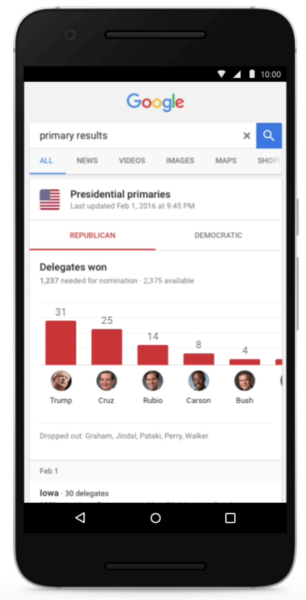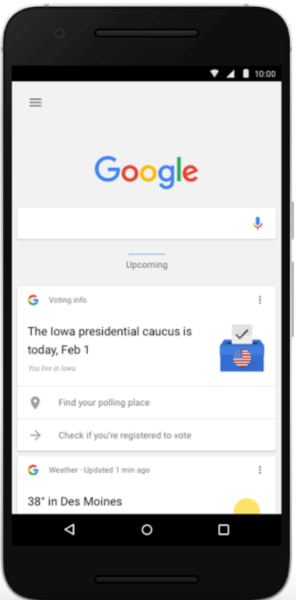Google Expanding Candidate Cards, Will Also Offer Primary Voting Reminders
Cards will deliver candidate and third-party content to inform voters about about their positions on issues; Google will also provide delegate counts.

Building on an experiment following the most recent Republican debate, Google will begin providing more in-depth election-related content in search results about the candidates and key issues.
In search and Google Now, users will be able to get a combination of candidate-generated content and third-party content about the primaries and the election.
These are not “candidate listing ads.” Google previously said there’s no advertising angle.
While the information is clearly useful, Search Engine Land’s Danny Sullivan criticized last week’s launch of candidate cards as a “disaster for search quality.” However, searches for specific issues or individual candidates may be less vulnerable to the sorts of problems he identifies in connection with the Republican debate (i.e., dominance by a single candidate).
Placement in search will be variable, depending on the query. Often, however, cards will appear at the top of results. As previously discussed, candidates will be able to provide their own statements and content. But Google will also be aggregating articles and providing “scorecards” for candidates based on state primary outcomes and delegate counts (See image above).
Google explains in a blog post:
Tracking what’s happening in the primaries and how each candidate is doing state-by-state can be hard. So now when you search for “primary results” or “resultados de la elección primaria” you’ll not only see the primary election schedule, but you’ll also see live results and an evolving tally of how many delegates each Republican and Democratic nominee has received. This feature works in English and Spanish.
Perhaps the most interesting thing Google will be doing is reminding people to vote. Cards will inform voters of the dates of their their state primaries. Google will also direct users to their polling places.
It will probably be difficult to measure the effect of voting reminders on turnout, but it could have an impact, which would not only be interesting and socially beneficial but also could potentially influence primary outcomes at the margins — especially with younger, more mobile-centric populations.
Another interesting and less obvious aspect of candidate and issue cards is that they might operate as an instant fact-checking vehicle for voters and journalists. This was something discussed 10 years ago by Google Executive Chairman Eric Schmidt as one of the social and democratic benefits of search.
Contributing authors are invited to create content for Search Engine Land and are chosen for their expertise and contribution to the search community. Our contributors work under the oversight of the editorial staff and contributions are checked for quality and relevance to our readers. The opinions they express are their own.
Related stories

